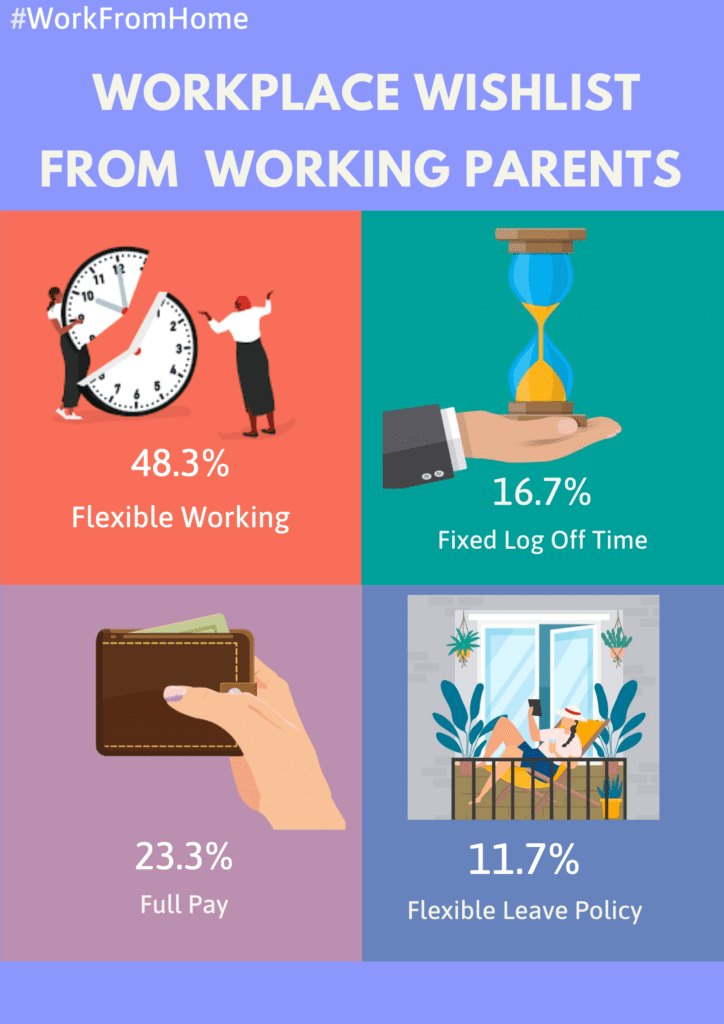Written By: Team Ungender
Note from the Editor: This is a new series on Ungender Insights, in the ‘Specials’ we feature the occassional data-driven or insight-driven peice that helps shed light on the state of sexual harassment or D&I at workplace in India.
Why This Report
This year, the Sexual Harassment of Women at Workplace (Prevention, Prohibition and Redressal) Act of 2013 completes seven years since its clearance by the Upper House of Parliament in February, 2013. There are several ways to help make workplaces safer, at Ungender we provide a number of services to organisations looking for PoSH compliance services.
The need for PoSH legislation is imperative in providing safe working places for people, especially for people of under-represented genders without easy access to spaces that are not only representative of their struggle but also conducive to their growth and wellbeing.
In the past couple of years, two major global events have shaken up workplaces from a stupor and denial and forced a rethink at an elementary level, through a combination of response, management, decision making and attitudinal shift, on sexual harassment and how it is viewed and tolerated as part of work culture.
The global Me Too movement not just highlighted the rampant nature of workplace sexual harassment and the inequities that hold women back, but it also pressed corporates around the world to go into an urgent stocktaking on what needs to be done to strengthen policies to make workplaces safer for women.
The global coronavirus pandemic has pushed employees to the brink of a mental health crisis and affected workers in more ways than one. Companies are gradually reckoning with remote work as a possibility for a near and uncertain future, and dealing with all that such uncertainity entails in terms of accessibility, empowerment, learning and hiring, while acknowledging the demands of unpaid labour.
In the absence of official and large scale data on the extent of sexual harassment at the workplace in India, a decisive and accurate picture on the state of employee safety is hard to surmise. However, there are enough testimonials to hint at what can only be called an epidemic of workplace misconduct, ranging from casual sexism, hostility, sexual harassment, and even assault.
With conversations around workplace safety becoming more commonplace, it is important to note that a measurement of attitudinal shifts and the state of knowledge around topics such as sexual harassment, the PoSH Act, diversity and inclusion, and mental health are indicative of the need for more engagement, gender rights and important labour force legislations to ensure engagement and crucial conversation.
This Ungender poll report, is our effort, to assess if people’s attitude knowledge and self-reported practices as lived expereinces, have undergone any change around these key topics. In looking at this data, we have been particularly interested in how “gender roles” play a part in the responses we receive.
Our intent is to, every six months, tabulate the results of our polls to generate data that will help us understand work practices, compliance, expectations and learnings better and help us analyse this data to press companies for policy changes.
Our Saas product CONDUCT combines data, technology and law to solve organisation’s gender inclusion mandates and we hope this periodic survey, can become a small mirror that companies hold to themselves as far as PoSH compliance and D&I is concerned.
Background and Method
Ungender posted a series of open polls to all followers on our Twitter handle on the Twitter platform. The intent and purpose of these questions has always been to gather a range of perspectives from our followers, of all genders, on issues concerning sexual harassment or diversity and inclusion at the workplace which is the focus of Ungender’s work.
In analysing the responses we received for each poll, we adopted the Knowledge, Attitude and Practice (KAP) framework to understand two things a) what the data from each individual poll tells us and b) how all polls taken together could be meaningfully analysed to reveal trends about collective intelligence on the diversity and inclusion space in India.
We decided to use the KAP framework because we felt a KAP survey achieves the following goals;
1) To identify knowledge gaps, cultural beliefs, and behavioral patterns that may identify needs, problems, and barriers to help plan and implement improvements.
2) To deepen the understanding of commonly known information, attitudes, and factors that influence behavior.
3) To generate baseline levels which can then be further used to measure changes in behaviours from subsequent surveys.
4) To assess and identify educational priorities given that changing behaviour is the goal.
In order to process the data, we first sorted all poll questions into three types of questions, viz., questions that focus on knowledge (K) such as the existence of PoSH rules or the Transgender Act, attitudes (A) such as what an appropriate bystander reaction to a sexual harassment should be and practice (P), such as questions on what currently happens at workplace or questions relating to workplace happiness priorities.
Knowledge questions were all dichotomised to a Yes/No scale, attitude questions to use a three-point or five-point Likert scale and practice questions used a three or four point categorical division.
We computed averages across each of the three categories so comments can be made about the state of knowledge versus attitudes versus practices. In addition, we also thematically organised sub-themes relating to say D&I for instance or PoSH composed of two or more questions, so insights across these sub-categories within the broad arcs of knowledge, attitude and practices could be drawn.
Finally we chose to report out the most interesting data trends and responses, both of individual questions and within categories via visualisations.
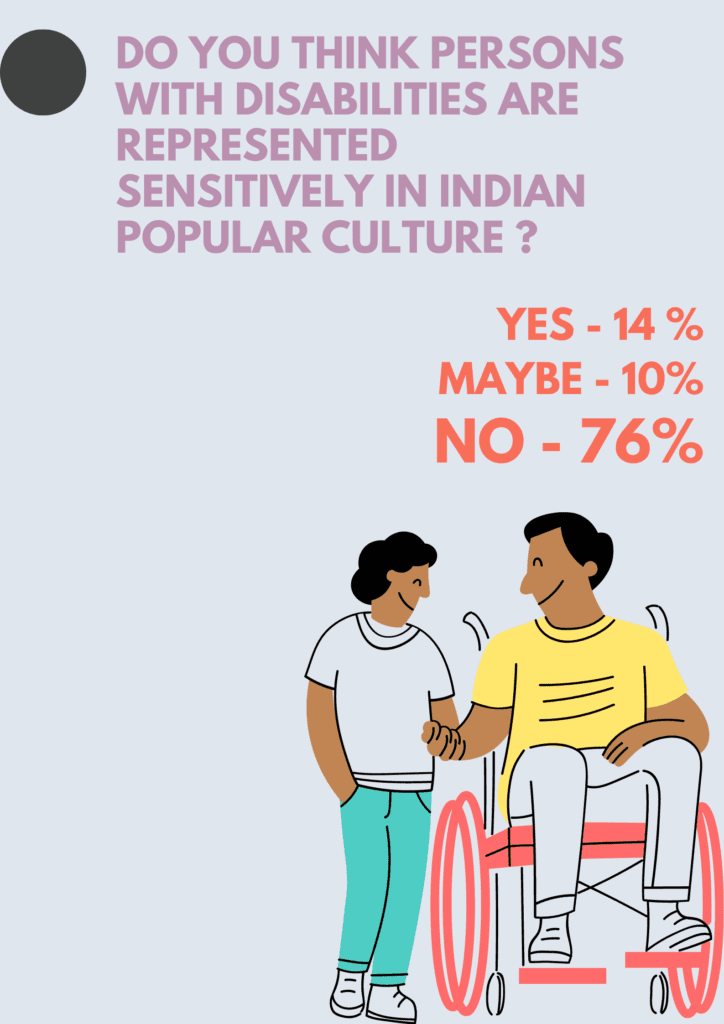
Out of a total of 60 questions that we asked our Twitter followers between January and June, after the KAP categorisation, we chose a set of 37 questions across ‘Knowledge, Attitude and Practice’ categories and sub-categorised them under the four main heads of Sexual Harassment, Mental Health, Diversity and Inclusion and Gender & Work, for ease of analysis. Each of these sub-blocks represent a key experience area for workers in modern workplaces that directly affect wellbeing, wage parity, empowerment, and growth.
In terms of study limitations it is important to note the following;
1. Sample sizes of individual questions are small and differ across each question. We do not claim that they are representative of the universe in any way. Since the entire polling exercise was conducted on one platform (twitter) and consisted of our followers or those who responded as a result of social media amplification efforts, the whole sample is purposive.
2. Since questions were not standardised, included no prior-framework and were optimised in phrasing to elicit responses, they do not constitute a scientifically constructed quantitative sample and at best can be considered a self-selected qualitative panel of responses.
3. Results are merely associative and not statistically correlative nor causal.
In terms of tools used for analysis – sorting was achieved using filtering on a standard excel sheet while visualisations were made in Python via the plotly code library. For cosmetic edits, plots were then further edited and produced using Canva.
Throughout this article we report out relative share of responses received in simple percentages to aid interpretation.
Result Highlights
80% of respondents have never had to file a sexual harassment complaint in their lives;
77% respondents did not know their legal rights if accused of sexual harassment at the workplace;
80% of men (assigned male at birth) have never faced sexual harassment at the workplace
80.50% of respondents feel mental harassment at the workplace needs to be regarded with the same seriousness as sexual and gender-based harassment;
90% of respondents feel organisations should mandatorily allow mental health days off as policy;
75.70% of respondents said persons with disabilities (PWDs) were not represented sensitively in Indian popular culture (especially cinema);
52% of respondents said they have been called a homophobic slur at work;
84% of respondents said their organization did not have a creche or daycare facility;
56% of respondents said they have lost a work opportunity because of their gender;
63% of women said they have never bought health insurance exclusively for themselves
On Sexual Harassment
In response to some of the questions asked to test the knowledge of respondents on various aspects of the PoSH law, we found that awareness was on the higher side. For eg. 85% of people polled were aware of the fact that the definition of workplaces under the PoSH Act also extended to commute to work and any sexual harassment taking place in these places will fall under the POSH law.
On being presented with the statement that a temporary employees of an organisation cannot file a sexual harassment case with the company’s IC, 64% of respondents found it to be false, while 18% said it was true, and and equal percentage of respondents said they weren’t sure. Similarly, 83% said they know that for the purpose of making a sexual harassment inquiry, the Internal Committee (IC) is vested with some of the powers of a Civil Court, while 17% said they weren’t aware. In further good news, 86% of respondents said they were aware of who the members of their office’s Internal Committee were.
Despite an overall good showing on some of the more obvious aspects of PoSH, we did see areas of confusion for questions that were slightly more nuanced or complex. Our polls show that over 80% of respondents have never had to file a sexual harassment complaint in their lives. Similarly, despite knowing the IC members as stated in previosuly, 80% of respondents answered in the negative when asked if they had IC member contact information. Respondents were also unaware of legal rights, with over 77% respondents saying said ‘No’, when asked if they knew what their legal rights were if they were ever accused of sexual harassment.
Individual responses to perceptions around sexual harassment largely pivoted around bias, fear of reprisal and lack of trust in the system. On the question, ‘have you ever hesitated to report an incident of sexual harassment at the workplace fearing retaliation from the person or from your organisation,’ 82% said they have. It’s interesting to note that men’s experience at the workplace differs vastly from women’s. We asked: ‘As a man have you ever faced sexual harassment at the workplace,’ to which 80% said ‘No.’
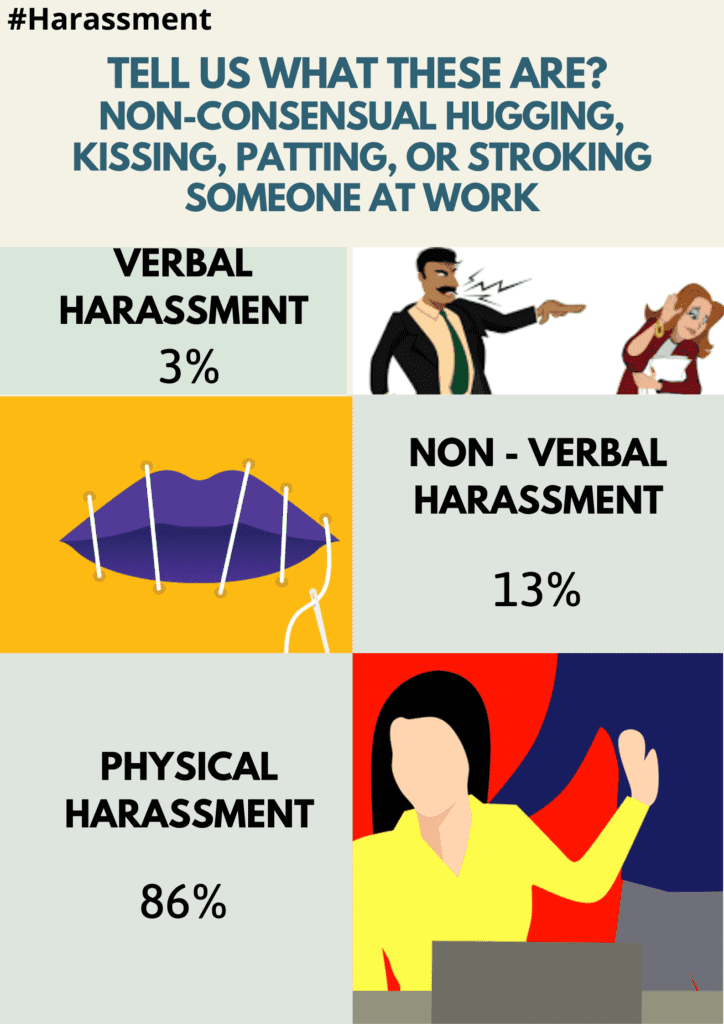
On workplace conduct and whether people know what constitutes sexual harassment, the overarching responses were indicative of clear knowledge about sexual harassment. For eg., we asked if ‘Elevator Eyes’ at work (looking a person up and down) is a form of harassment and 82% respondents said it was. Similarly, 82.5% of respondents recognised that non-consensual hugging, kissing, patting, or stroking someone at work is a physical form of sexual harassment.
Close to 73% of respondents said referring to an adult as a ‘girl’, ‘darling’, ‘doll’, ‘babe’, or ‘hunk’, at the workplace is sexual harassment. We also found that 45% of respondents said the most common form of stalking they have undergone at the workplace was in the form of unwanted texts and emails. Nealy half of all respondents (46%) identified the lack of intent in leadership as the key reason behind sexual harassment continuing at workplaces. As far as bystander interventions go, 50% of respondents preferred to ask the victim directly what they wanted.
We are now sharing our learnings from six years of PoSH advocacy through a series of webinars. Visit our learnings page to know more. Our Executive PoSH Certificate Programme helps train IC members for organisations. Check out the brochure here.
Mental Health
Mental health is a brewing crisis in a post-Covid world.
The World Health Organisation says “the fear of contracting the virus in a pandemic such as COVID-19, significantly changes our daily lives as our movements are restricted in support of efforts to contain and slow down the spread of the virus.”
There will be new realities of working from home, temporary unemployment, home-schooling of children, and lack of physical contact with other family members, friends and colleagues and these will be some of the external reasons behind a potential mental health emergency. In our poll questions, we tried to ascertain what kind of mental health support people need from their workplaces to work better.
To our question, ‘Do you feel targeted mental harassment at the workplace needs to be more widely regarded as severely as sexual and gender-based harassment?, 80.50% answered in the affirmative. Nearly all (90%) respondents felt that organisations should mandatorily allow mental health days off as policy. All respondents, to a question on whether they have used the excuse of a fever to take a day off from work due to mental health, because they couldn’t state the real reason for fear of being judged, said that they have done this.
That a question on a mental health workplace practices should get a hundred perecent response rate in support, is an urgent and alarming comment on the need for workplaces to start a conversation around wellbeing leaves that currently do not exist.
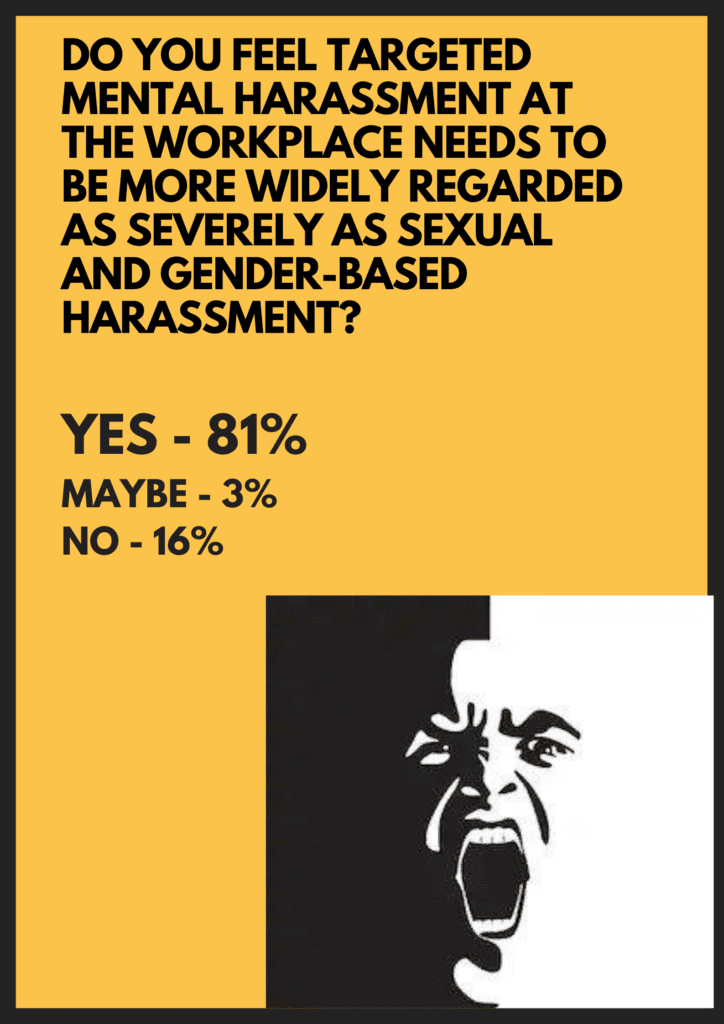
“Often dealing with people with mental health issues is seen as charity. I think that’s the wrong way to go about approaching it. You don’t have to be nice to people and you don’t have to go out of your way to help people because it’s a good thing to do. I would appeal to employers self-interest. It’s very simple, look at the costs of depression. For every 10 rupees that depression costs us and costs society, only about rupees 2 is actually spent on treatment. The remaining 8 rupees is almost completely accounted for by a reduction in output.” — Dr. Soumitra Pathare, Director of Centre for Mental Health Law and Policy at the Indian Law Society’s Law College in Pune
Nearly a quarter (18%) of women respondents were found to be struggling with managing health and time during the lockdown, but their overall struggle (according to half the respondents at 47%) of was with managing household during Covid. The pandemic has indeed been worse for women.
Diversity and Inclusion
“Diversity in action is inclusion,” Yashmi Pujara, CHRO of Cactus Global Communications, recently told Ungender during an interview. As workplaces figure out the nitty gritties of remote work, and depend heavily on infrastructure, there’s a broadening of the scope for a section of workforce that did not have this access before.
Never before had there been a greater need for a conversation on diversity and inclusion, as there is now, with Covid eliminating most of the excuses that companies hold up as roadblocks for inclusive hiring. In our poll questions, we wanted not only to see the extent of knowledge people had about D&I, but also to understand the gaps that exist between knowledge and practice.
We found that nearly eighty percent (76%) of respondents knew what the words diversity and inclusion meant — a hopeful sign of more engaged conversations around this subject.
Meanwhile 75.70% of respondents said persons with disabilities (PWDs) were not represented sensitively in Indian popular culture (especially cinema) and 52% of respondents said they have been called a homophobic slur at work. When it comes to law, there’s still a wide gap in public knowledge about the legislations that are core to the fundamental rights of marginalised groups.
Our polls show, for eg., that 70% respondents said they weren’t aware of the Transgender Persons (Protection of Rights) Act, 2019, and nearly three-quarters of (74%) of respondents weren’t aware of the clauses of the Maternity Benefits (Amendment) Act, 2017.
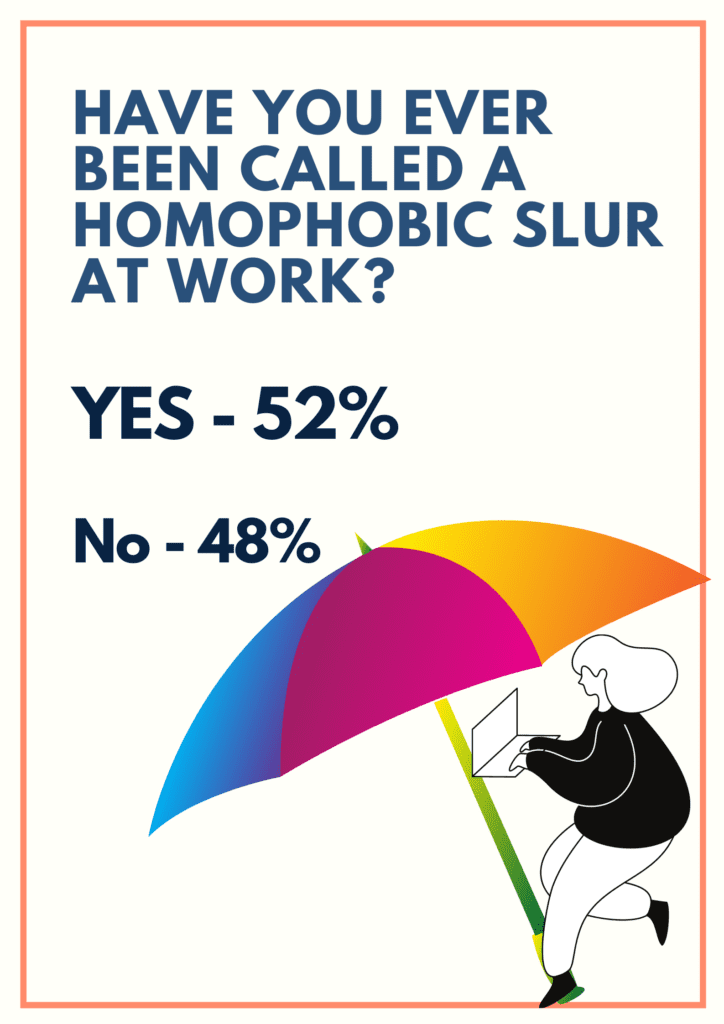
Workplaces may have expanded and grown but accessibility remains a major challenge still for PwDs, with 82% of respondents (Attitude question) saying that their workplace or home complex are not wheelchair accessible. Among some of the gender-positive changes people wanted to see in their offices, queer-friendly bathrooms were a priority for (Practice question) respondents who ranked this option the highest at 38.6%.
“At IQVIA women are 49% of the workforce which is phenomenal. This has been the scenario in IQ for a fair bit of time. It’s in the DNA of the organisation. Now, when we look at hiring, diversity and inclusion is something which we don’t think of twice honestly,because we have always done it. Is there no challenge with respect to diversity and inclusion? There are challenges, particularly at the senior levels. That probably is one of our areas of focus” Shiben Moitra, Senior HR Diector at IQVIA, told Ungender during an interview.
What does it take to build an inclusive workplace?
1. Knowing where your establishment stands from a diversity and inclusion perspective.
2. Putting the right and adequate policies, frameworks and processes in place with sufficient checks and balances to identify progress in diversity and inclusion.
3. Aligning decision makers, stakeholders, beneficiaries at every front through customized sensitization, training and capacity building activities.
At Ungender Legal Advisory our services are aligned to help workplaces build a work culture that’s based on respect, understanding of diversity and inclusion, clear knowledge of the laws that ensure safety and helping in compliance.
Gender and Work
In an interview with Ungender, Monica Pillai, who heads People Operations at Obvious.in said: “If you know India, you know, a certain set of people come from a certain socio economic background. Your lived experience is very disconnected from a huge portion of this country. When you’re building a product that you know will go out to what we call ‘country scale’, this is millions of people in many cases.”
Gender plays a key role in this disconnect. For our fourth category of polls, ‘Gender and Work’, we had interesting insights into what people wanted from their workplaces to account for their gender and lived experiences and unpaid labour they put in at home. We asked, should companies have optional work from home policies to allow employees, especially women, more flexibility in managing work and personal health, and the answer overwhelmingly (87%) was yes.
Covid has also changed the working patterns among a large population, 61% of respondents said they will not go back to an office space if they were given the choice to continue working from home. While flexibility has eased work lives of employees tackling multiple challenges, there has also been the added component of longer work hours. Nearly eighty percent (76%) of respondents said their work hourshave increased during Covid work from home.
Some of the adversities employees face are directly due to a lack of infrastructure and absence of gender positive and anti-discriminatory policies at the workplace. For eg, 84% of respondents said their organization did not have a creche or daycare facility, 56% of respondents polled said they have lost a work opportunity because of their gender, and 63% of women polled said they have never bought health insurance exclusively for themselves.
Finally, we think here’s where companies can proactively read the room, ever more so now, when employees are juggling longer hours in adverse conditions, to change policies. All they have to do is listen to to what employees want.
Nearly half (48%) of respondents polled said their greatest need-of-the-hour from the workplace was flexible working hours.
Responses on Average
On average, It seems like knowledge levels have improved, about 54%, of all respondents, to all knowldege questions picked the right response to questions that attempted to assess PoSH or D&I knowledge. Unfortunately a near identical percentage, on average, also holds true for poor attitudes in the space, 55% of all respondents, report being placed in some sort of less than ideal or discriminatory situation, across a plethora of attitudinal questions.
Ungender Insights is the product of our learning from advisory work at Ungender. Our team specializes in advising workplaces on workplace diversity and inclusion. Write to us at contact@ungender.in to understand how we can partner with your organization to build a more inclusive workplace.


